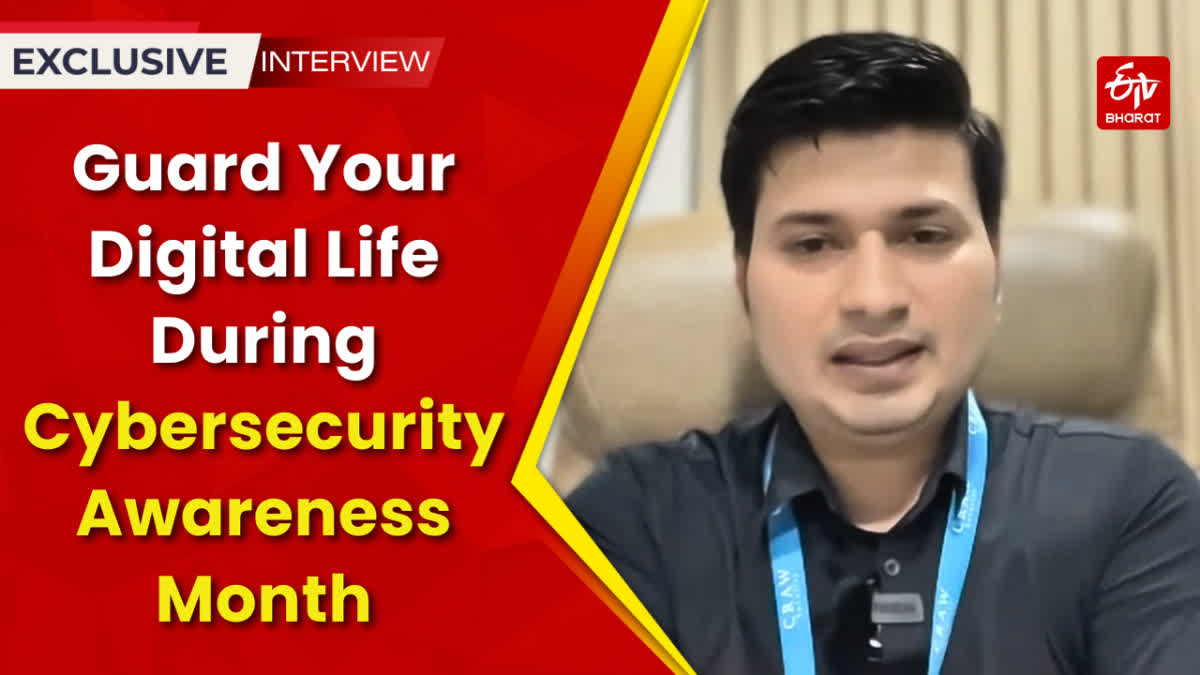New Delhi:As the world becomes increasingly digital, October has been designated National Cybersecurity Awareness Month. This initiative aims to empower individuals and organisations with the knowledge necessary to protect themselves against an ever-growing array of cyber threats. In an exclusive interview with ETV Bharat, cybersecurity expert Mohit Yadav shared crucial insights and practical tips on how to stay safe online, emphasising the importance of ongoing vigilance throughout the year.
The Landscape of Cyber Threats
Yadav opened the discussion by explaining the evolving nature of cyber threats. "Every day, hackers and scammers devise new methods to exploit individuals. One of the most alarming tactics is what we call 'digital arrest,'" he said. Scammers employ psychological tactics to create a sense of urgency, often posing as law enforcement officers.
"For instance," Yadav explained, "a scammer may call a victim and claim that a family member is involved in a serious legal issue, such as a drug case. Under pressure, the victim may reveal sensitive information, like their Aadhaar number, which the scammer then uses to commit fraud."
This tactic of psychological manipulation can lead to devastating consequences, including financial loss and emotional distress. Yadav noted that this strategy is particularly effective because it leverages fear and urgency to coerce victims into compliance.
Common Scams to Watch Out For
Yadav highlighted several prevalent scams that are currently in circulation. One common scheme involves scammers posing as representatives from telecommunications companies, claiming that the victim's phone number has been linked to illegal activities. "These scammers create a sense of urgency, telling the victim that their number will be blocked unless they install a specific app," Yadav cautioned. "In reality, this app often contains malware designed to steal personal information and financial data."
Another scam gaining traction involves fake social media interactions. Scammers may connect with potential victims on platforms like Facebook, leading to video chats that they record. "These scammers then morph the recorded videos with explicit content and threaten to publish them unless a ransom is paid," Yadav explained. "Just recently, a senior executive lost over a crore of rupees in a similar situation."
Understanding Phishing
Phishing scams remain one of the most common cyber threats. "Phishing typically involves deceptive emails that lure victims with promises of prizes or urgent account errors requiring immediate action," Yadav said. He emphasised the importance of caution when dealing with unsolicited emails.
"Never click on links or provide personal information in response to such emails. Always scrutinise the email address closely," he advised. Yadav pointed out that scammers often use email addresses that appear legitimate at first glance, but contain subtle misspellings. "For example, you might receive an email purporting to be from 'Delhi Police', but if you look closely, the spelling is slightly off. Always verify the source."
Password Security and Two-Factor Authentication
Yadav stressed that password security is fundamental to protecting oneself online. "A strong password should include at least eight characters, combining uppercase and lowercase letters, numbers, and special symbols," he said. "Moreover, never use the same password across multiple accounts. If one account is compromised, others will be at risk."
To enhance security, Yadav recommended enabling two-factor authentication (2FA) wherever possible. "This adds an extra layer of security by requiring a second form of verification, usually a one-time password sent to your phone. Even if someone has your password, they won't be able to access your account without that second factor," he explained.
Navigating Social Media Safely
